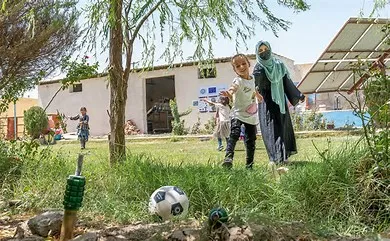KABUL, Afghanistan: The United Nations Children’s Fund (UNICEF) reported that in 2024, over 500 Afghan children lost their lives or sustained injuries due to explosions caused by unexploded ordnances (UXOs) and remnants of war.
UNICEF’s Educational Efforts to Combat Explosive Risks
To address this critical issue, UNICEF trained approximately three million children and their caregivers on how to recognize, avoid, and report explosive remnants. A picture shared on UNICEF Afghanistan’s social media showcased children participating in these life-saving training sessions.
In a post on X, UNICEF stated, “In 2024, more than 500 children were killed or gravely injured by unexploded ordnances or explosive remnants of war. UNICEF educated around 3 million children and caregivers on the risks of explosive ordnances last year, including how to identify, avoid, and report them.”
Landmine Contamination in Afghanistan
The HALO Trust, a leading demining organization, highlighted that over 65 square kilometers of land across 26 Afghan provinces remain contaminated with improvised explosive devices (IEDs). Afghanistan is listed among the four most heavily mine-contaminated countries globally.
HALO Trust currently employs 2,235 demining personnel in the country, working to clear these hazards. However, the scale of contamination remains immense, stemming from the Taliban’s use of landmines without systematic mapping to target security lines of former governments and foreign forces.
Call for Increased Support
The contamination of Afghan land poses an ongoing threat, particularly to children in rural communities. Additional demining operations and educational campaigns are urgently needed to prevent further casualties. UNICEF and other organizations have called on the international community to enhance their support for these life-saving efforts.
Food Crisis Compounds Humanitarian Challenges
Alongside the threat of UXOs, Afghanistan faces a severe food crisis. The World Food Program (WFP) recently reported that it could only provide aid to seven million of the 14 million Afghans in need due to funding shortages.
Pauline Eloff, head of WFP’s emergency department, stated that “for every two families who require food assistance, the organization can only help one.” Remote communities are particularly vulnerable, with many relying entirely on food aid to survive the harsh winter months.
The WFP has called on the international community to extend their support to ensure vulnerable families receive the assistance needed to endure the winter.






















